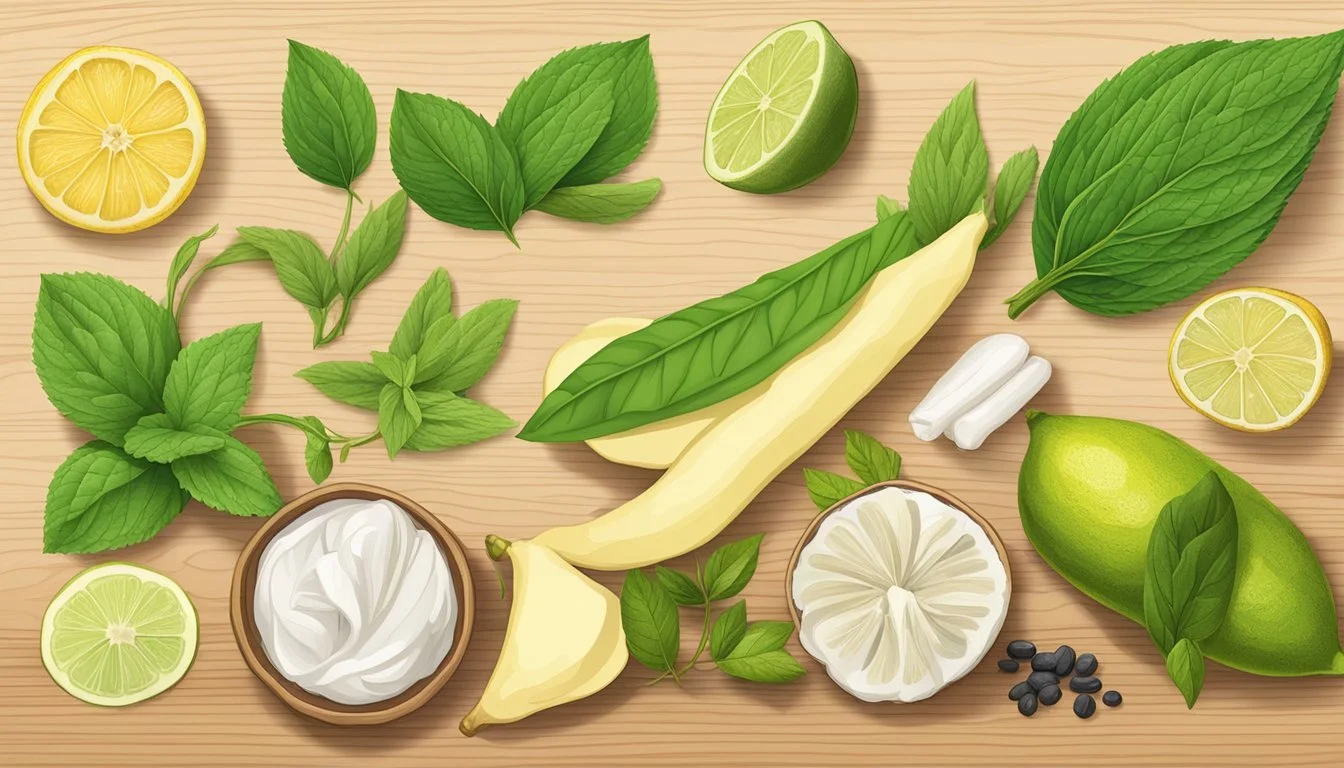Lemon Extract Substitutes
Top Alternatives for Your Recipes
Lemon extract is a concentrated flavoring made from lemon oil, often used in cooking and baking to imbue dishes with a bright, citrus flavor. It's an ingredient favored for its intensity and ability to retain a strong lemon essence without the acidity or extra liquid that lemon juice provides. However, in instances where lemon extract is unavailable, cooks and bakers may need to consider alternatives to maintain the desired taste profile in their recipes.
Substitutes for lemon extract are sought not just out of necessity but also for variety, dietary restrictions, or even personal taste preferences. Options such as lemon zest, lime juice, and orange extract can provide similar citrus notes, each bringing their unique characteristics to a dish. Lime juice, in particular, shares a close flavor profile with lemon and can be used in equal amounts as a substitute in recipes.
A deeper understanding of how these substitutes interact with other ingredients is key in achieving a successful flavor replication. It's important to consider factors such as the moisture content they add to recipes or the intensity of flavor they impart. For example, citrus zests are less likely to alter the texture or moisture of baked goods compared to their juice counterparts and can be a closer match to the extract when used in comparable quantities.
Understanding Lemon Extract
Lemon extract is a concentrated solution with robust citrus flavor, derived primarily from lemon oil. Its role is pivotal in imparting the quintessential lemon zest to various culinary creations.
Composition and Properties
Lemon extract consists predominantly of lemon oil, an essential oil obtained from lemon peel, and possesses a high concentration of the characteristic citrus flavor. This potent extract carries the essence of lemon in a form that is both acidic and aromatic, contributing a tangy and refreshing taste to any dish. The acidic nature of lemon extract is due to the presence of citric acid, which is abundant in lemons. This acidity contributes not only to its bright flavor profile but also to a slightly longer shelf life compared to fresh lemon zest or juice.
Key Components:
Lemon oil
Alcohol (as a solvent)
Citric acid
Common Uses in Cooking
In cooking, lemon extract is used to infuse a clean, lemon flavoring into various recipes without altering their moisture content significantly. It excels in baked goods such as cakes and cookies, where it imparts a distinct lemon essence without the added liquid of lemon juice. Lemon extract is not just confined to desserts; it layers complexity into savory dishes, dressings, and marinades by offering its pronounced flavor profile and aroma.
Diverse Applications:
Desserts: cakes, cookies, sorbets
Savory dishes: marinades, sauces
Beverages: cocktails, flavoring syrups
The concentrated nature of the extract means a small quantity can go a long way in delivering the desired tang without diluting other components of a recipe.
Culinary Substitutes for Lemon Extract
In scenarios where lemon extract is not available, various other ingredients can be utilized to emulate its citrusy flavor in desserts, baking, and marinades. The following are some effective substitutions.
Lemon Juice as a Substitute
Lemon juice can replace lemon extract, especially when acidity is required alongside the lemon flavor. Use two tablespoons of lemon juice in place of one teaspoon of lemon extract. It is vital to balance this with a reduction in other liquids in baked goods to maintain consistency.
Other Citrus Juices
Lime juice can serve as a substitute, imparting a similar citrus note. Orange juice is slightly sweeter but can still be used as a substitute, typically in a two-to-one ratio with lemon extract. These substitutions are best used in recipes where the slight variance in citrus flavor complements the dish.
Citrus Zests
Zests from lemons, limes, or oranges offer a concentrated flavor without additional liquid, making them ideal for baked goods and desserts. Use one tablespoon of zest to replace one teaspoon of lemon extract.
Vinegar-Based Substitutes
In dressings and marinades, where lemon extract's tanginess is desired, vinegar can be a viable alternative. White wine vinegar or apple cider vinegar serves this purpose well, although they should be used sparingly due to their potency.
Alcoholic Substitutes
For those who seek a substitute in alcohol-based recipes, vodka can be used as it provides a flavorless alcohol base. Limoncello or other citrus-flavored liqueurs may also be suitable but consider their sweetness. Use these alcoholic substitutes in equal measure to the lemon extract required.
Non-Citrus Alternatives
When the distinct tang of lemon extract isn’t suitable due to allergies or personal preferences, several non-citrus alternatives can provide an appealing flavor profile in a variety of recipes.
Using Other Flavor Extracts
Orange Extract: Although orange extract is technically citrus, it's sometimes tolerated by individuals who have specific reactions to lemons and limes. It offers a sweet, floral note and can replace lemon extract using a 1:1 ratio.
Vanilla Extract: A universally beloved option, vanilla extract adds a warm, complex flavor to desserts and sweet dishes. It doesn't mimic the tartness of lemon, but it complements the sweetness in recipes like cakes and cookies. Substitute with equal parts of vanilla extract for the lemon extract.
Almond Extract: With its nutty and slightly sweet profile, almond extract can serve as a flavoring in place of lemon extract. Its strong flavor means it should be used sparingly, roughly half the amount of lemon extract called for in the recipe.
Utilizing Aromatics
Artificial Flavoring: Various artificial flavorings can replicate the essence of lemon without involving any citrus. They usually contain alcohol and are formulated to mimic the desired taste. Use them in equal amounts as the lemon extract specified in the recipe.
Flavor Profile: When selecting a non-citrus alternative, the aim is to achieve a comparable flavor profile within the dish without using lemon components. Aromatics like herbs or spices can infuse a similar zestiness or freshness. For example, lemongrass, though distinct from lemon, can lend a fresh, lemon-like scent to dishes in the absence of lemon flavor.
In summary, a myriad of extracts and aromatics stand ready to replace lemon extract, each bringing its own unique essence to the culinary palette. Whether the goal is to maintain a semblance of citrusy zest without actual citrus or to embark on an entirely different flavor journey, these alternatives offer adaptability and variation.
Usage Tips for Lemon Extract Substitutes
When substituting lemon extract, attention to acidity levels, flavor matching, and the impact on texture and consistency are essential for preserving the integrity of your dish.
Adjusting Acidity
Using lemon juice or other citrus juices as a substitute for lemon extract can result in a change in the acidity of the recipe. One should:
Use two tablespoons of fresh lemon juice to replace one teaspoon of lemon extract.
Add baking soda to counteract excess acidity if necessary—roughly 1/4 teaspoon for each tablespoon of citrus juice added to maintain balance.
For Baking:
Extract Replaced Fresh Lemon Juice Baking Soda (optional) 1 tsp 2 tbsp 1/4 tsp
Matching Flavors
Several substitutes can provide a similar citrus flavor to that of lemon extract:
Lime juice offers a tartness close to that of lemon, and can be used in equal parts as a substitute.
Orange juice is sweeter and less tart but can contribute to a citrusy taste when lemon is unavailable. Use a ratio of 2 tablespoons orange juice to 1 teaspoon lemon extract.
Considering Texture and Consistency
Substitutes vary in consistency and might affect the final texture of a dish.
When using substitutes like lemon oil, which is more concentrated than lemon extract, use less. Begin with half the amount and adjust to taste.
Dry substitutes such as grated lemon peel or dried lemon peel will alter moisture levels. Start with 1 teaspoon for each teaspoon of extract and adjust for flavor and texture.
Careful measurement and incremental adjustment are key to successfully using lemon extract substitutes in cooking and baking.
Application in Recipes
When substituting lemon extract in recipes, it's important to consider the intensity of flavor and the form of the substitute. The right alternative can provide the desired citrus essence without altering the texture or moisture balance of the dish.
Desserts and Baked Goods
In desserts and baked goods, someone might opt for lemon juice or zest to mimic the citrus kick that lemon extract provides. For cakes, cookies, and muffins, using lemon zest is particularly effective as it imparts a fragrant, citrusy flavor without adding extra liquid. The zest of other citrus fruits like lime or orange can also be used for a subtler taste. Here's a rule of thumb:
For every teaspoon of lemon extract, use two tablespoons of lemon juice or one tablespoon of lemon zest.
Lemon meringue pie or custard requires a careful balance of liquid, so one should consider reducing other liquids when using a more diluted substitute like juice. Lemon essence, a more concentrated flavoring, can be a handy one-to-one substitute without the need to adjust liquid ratios.
Savory Dishes
For savory dishes, the use of lemon juice or vinegars infused with citrus zests can add both acidity and aroma. One doesn't just benefit from the lemon flavor but also from the brightness that lemon extract usually brings. Lemon or lime zest works particularly well in recipes as it infuses the dish with a fragrant, citrus aroma without being overpowering.
In marinades and cooked sauces, substitute equal amounts of zest for extract.
Salad Dressings and Sauces
Salad dressings and sauces often rely on the sharpness of lemon to cut through other flavors. When lemon extract is unavailable, one can substitute equal amounts of fresh lemon or lime juice, although the acidity might need to be balanced with a sweetener. Alternatively, orange zest or orange extract can provide a milder citrus note that complements greens and vinaigrettes elegantly.
For dressings, mix in the zest of one lemon to replace a teaspoon of extract to enhance flavor without altering viscosity.
Additional Considerations
When selecting a lemon extract substitute, it's important to consider shelf life, nutritional impact, and how different substitutes may require adjustments in culinary techniques to achieve the desired effect in recipes.
Shelf Life and Storage
Shelf Life:
Fresh lemons have a shelf life of 2-4 weeks at room temperature and can be extended to 1-2 months in the refrigerator.
Lemon peel, when dried or zested, can last several months if stored in a cool, dark place.
Citrus extracts and lemon essential oils are generally shelf-stable for a couple of years if kept in a dark bottle away from direct sunlight.
Storage:
Fresh lemons should be stored in a mesh bag away from moisture to prevent spoilage.
Dried lemon peel and zest should be kept in an airtight container.
Store citrus extracts and lemon essential oil in their original containers to maintain potency.
Nutritional Aspects
Fresh lemons provide vitamin C and have minimal calories, which can vary slightly when using lemon as a substitute in recipes.
Lemon peel contains essential oils and has high concentrations of flavonoids.
Commercial citrus extracts and lemon essential oil should be used in small amounts due to their concentrated nature, and they don't contribute significantly to nutritional intake.
Culinary Techniques
When substituting lemon juice for extract, one may need to reduce other liquids in the recipe to maintain consistency, especially in baking.
Utilizing lemon zest or peel requires finely grating to avoid the inclusion of bitter pith.
Lemon essential oil is potent; they should use it sparingly, often diluted to avoid overpowering dishes.
Incorporating substitutes can involve altering cooking times or methods, such as increasing simmering time to infuse flavors when using fresh lemons.




